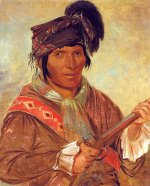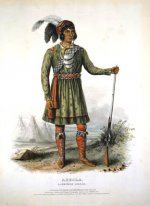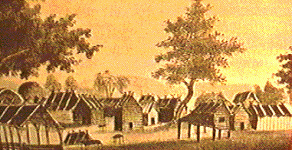Second Seminole Indian War
1835 - 1842
Continues......
General Scott's campaign
Gen. Eustis burned Pilaklikaha, or Abraham's Town on his way to join Gen. Scott's campaign.
General Scott had begun assembling men and supplies for a grand campaign against the Seminoles. Three columns, totaling 5,000 men, were to converge on the Cove of the Withlacoochee, trapping the Seminoles with a force large enough to defeat them. Scott would accompany one column, under the command of General Clinch, moving south from Fort Drane. A second column, under Brig. Gen. Abraham Eustis, would travel southwest from Volusia, a town on the St. Johns River. The third wing, under the command of Col. William Lindsay, would move north from Fort Brooke.
The plan was for the three columns to arrive at the Cove simultaneously so as to prevent the Seminoles from escaping. Eustis and Lindsay were supposed to be in place on March 25, so that Clinch's column could drive the Seminoles into them.
On the way from St. Augustine to Volusia to take up his starting position, Gen. Eustis found Pilaklikaha, or Palatlakaha, also known as Abraham's Town. Abraham was a Black Seminole leader, and interpreter for the Seminoles. Eustis burned the town before moving on to Volusia.
All three columns were delayed. Eustis was two days late departing Volusia because of an attack by the Seminoles. Clinch's and Lindsay's columns only reached their positions on March 28. Because of problems crossing through uncharted territory, Eustis's column did not arrive until March 30. Clinch crossed the Withlacoochee on March 29 to attack the Seminoles in the Cove, but found the villages deserted. Eustis's column did fight a skirmish with some Seminoles before reaching its assigned position, but the whole action had killed or captured only a few Seminoles.
On March 31 all three commanders, running low on supplies, headed for Fort Brooke. The failure of the expedition to effectively engage the Seminoles was seen as a defeat, and was blamed on insufficient time for planning and an inhospitable climate.






